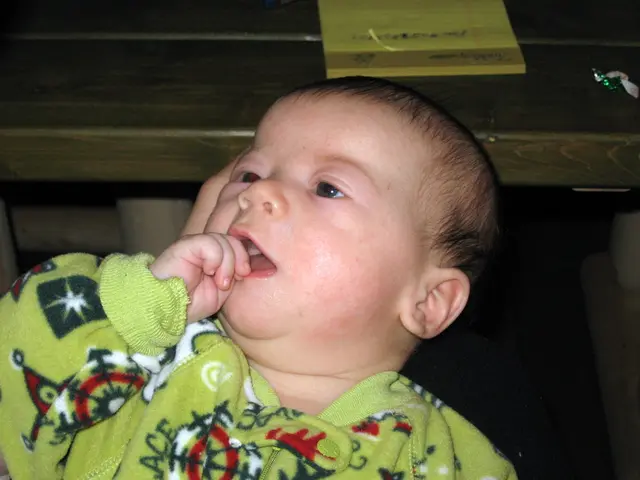Understanding Indicators of Emotional Growth: A Handbook for Parents
Guide to Recognizing Healthy Emotional Growth:
Parenting is hard, but we've got your back! This guide is crammed with tips and tricks to help your kiddos thrive emotionally, from cradle to college. Emotional development is essential for a child's happiness, growth, and success. By supporting your little ones during these crucial stages, you can help them conquer life's highs and lows with resilience.
Let's dive right in!
The Fundamentals of Emotional Growth:
Emotional growth is the foundation for a child's well-being, tied to brain development and life experiences. It affects a child's success in school, family life, and beyond. Check out these key components to kick-start your kid's emotional journey:
- Trust, security, and consistent care: Offer a safe haven for your bundle of joy, show 'em plenty of lovey-dovey, and be there when they need ya.
- Eliminate fears and provide a sense of safety: Stability at home sets the stage for a child to feel confident exploring the world.
- Forge strong bonds: Make sure you're your child's ride-or-die squad, and they'll be more inclined to face life's challenges head-on.
- Positivity all day, e'ry day: Give your kid compliments and praise to reinforce their good behavior.
The Brain's Role in Emotional Development:
Did you know, a baby's brain grows faster than a money tree in a bank? (Well, not really, but it sorta feels like that, right?) Skills like managing emotions and making decisions are honed during the first few years of life. Establishing emotional foundations in early childhood paves the way for later abilities:
- Brain development impacts emotional development. Teaching our little ones how to express their feelings lays the groundwork for empathy and social skills.
- Early experiences shape a child's emotional base. Caregiver relationships, nurturing experiences, and other supportive relationships set the stage for emotional growth throughout their childhood.
By understanding emotional growth, you can offer the support your child needs every step of the way.
Milestones from Birth to Age Two:
Babies grow so fast, it'll make your head spin! From the moment they enter the world, they start developing a range of emotions from joy to fear. Take a look at these milestones to track your child's emotional development:
- Newborn to 1 month: Babies can sense emotions and start smiling socially around the 1-month mark.
- 1-4 months: Babies learn to recognize their main caregivers. They start to play with things and get all gooey over caregivers.
- 4-8 months: Babies show empathy and some self-awareness. They get jealous and sad when separated from their caregivers.
- 8-12 months: Babies are curious little explorers who like to share and care for loved ones.
By 30 months, tots want their independence, so let them forma little rebel without a pause, and be there to guide them safely through this exciting stage.
Preschool Years (Ages 2-5):
Kids this age develop rapidly, and things get interesting as they fine-tune their emotional, social, and thinking skills. Here are the key milestones during this period:
- Social interaction patterns: Preschoolers learn how to play well with others. They start understanding sharing and taking turns.
- Expression of feelings: Preschoolers gain new words daily and start expressing their feelings more clearly.
- Self-regulation: Preschoolers get better at controlling their emotions but still need some guidance from us grown-ups.
By knowing the stages of emotional development, you can help support and guide your child's growth.
Creating a Nurturing Home Environment:
Building trust and fostering emotional development starts at home. Here are some practical ways to create a nurturing environment for your little bundles of joy:
- Install safety measures: Secure staircases, childproof sharp objects, and cover electrical outlets to ensure your home is a safe haven.
- Set routines: Daily routines provide structure and consistency for kids. Rituals like morning circle time, dedicated playtime, and mealtime help kids feel secure.
- Talk openly and listen actively: Listen carefully to your child's concerns, offer comfort, and support when they're feeling down.
- Stay involved: Engage in your child's activities and interests to show you care.
By creating a caring atmosphere, you're setting the stage for your child's personal growth and future success.
Healthy Attachment Patterns:
Establishing secure attachments helps shape a child's emotional growth. A secure base offers a child a safe place to explore and grow confidently. You can forge strong bonds with your child using the following techniques:
- Be present and consistent: Respond quickly and be there for your child when they need you most.
- Practice bonding techniques: Skin-to-skin contact, playful interactions, and other bonding activities promote healthy attachments.
- Create a safe space: Offer your child an emotional sanctuary where they feel comfortable expressing themselves.
Emotional Intelligence:
Emotional intelligence (EI) is the ability to recognize, understand, and manage emotions. It lays the foundation for a child's future success. You can help boost your child's emotional intelligence with the following strategies:
- Model effectively: Demonstrate healthy emotional responses and communicate with empathy and kindness.
- Promote open dialogue: Discuss emotions and encourage your child to express their feelings honestly.
- Teach coping strategies: Show your child different ways to manage emotions and handle tough situations.
- Use socialization: Encourage your child to interact with others and teach empathy and cooperation.
In Summary:
Recognizing healthy emotional development in children is key to their happiness, strength, and success. By focusing on emotional intelligence, resilience, and nurturing a supportive home environment, you can provide your child with the tools they need to navigate life's ups and downs. So go ahead, get your cape on, and join them on this incredible ride called parenthood!
- The supportive relationships caregivers establish with children in their early lives set the stage for healthy emotional growth, shaping their success in school, family life, and beyond.
- By teaching children how to express their emotions, caregivers lay the groundwork for empathy and social skills, skills essential for emotional development.
- Practicing effective communication, offering empathy, and modeling healthy emotional responses can help boost a child's emotional intelligence, laying the foundation for their future success.
- Encouraging children to share their feelings, express themselves, and interact with others helps promote empathy and cooperation, which are key components of emotional intelligence.
- To foster emotional development, parents can install safety measures at home, set routines, and engage in their child's activities to show they care, creating a caring atmosphere.
- By establishing secure attachments with children, ensuring a quick response and consistency, practicing bonding techniques, and creating a safe space for emotional expression, parents can forge strong bonds and offer a secure base for exploration and confidence-building.








